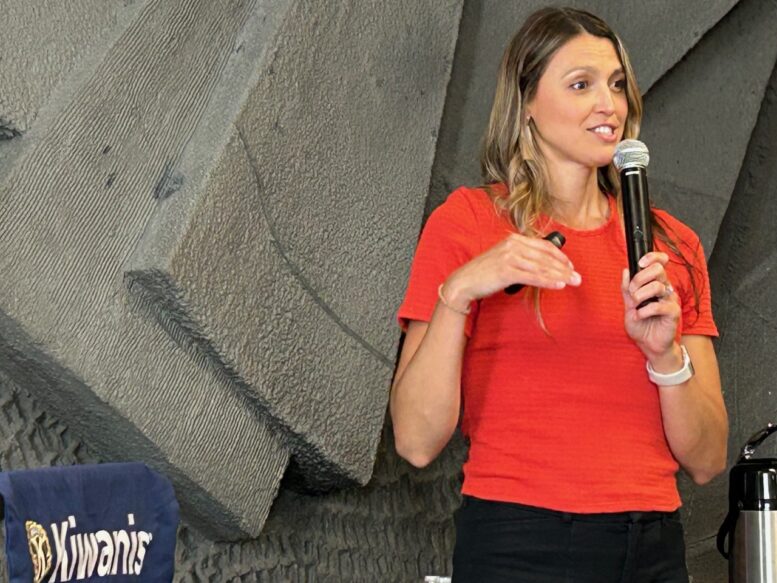By DAVID DUPONT
BG Independent News
When Karyn Smith, a health educator in the BGSU Office of Recreation and Wellness, addressed the Bowling Green Kiwanis Club recently about Exercise as Medicine, she could assume there were already converts in the audience.
About half dozen or so of her listeners participate in the Silver Sneakers strength training class she leads on Tuesday and Thursday mornings. And likely they were happy she was there to talk and not put them through their paces lifting weights, doing chair squats, wall push ups, stretching, and al manner of exercises to increase their strength, balance, flexibility, and even mood.

And with some of the members in their class well into their 80s, and one 90 years old, they provide evidence her message about the importance of physical activity. “Many of them are more fit than some of our college students,” she said.
Smith did make sure to sneak in movement into her presentation.
Asking true and false questions, she had the Kiwanians respond by doing one of two movements.
When she asked, true or false: Physical activity is one of the most important things you can do for your health. Those answering true — the right answer —did a few arm circles. While the others signaled their answer as false by marching in place. No one did.
That was one of the lessons from the talk — incorporate movement into your day. Make sure that extended periods of sitting are broken up by a bit of movement. “Incorporating small breaks in your day by doing micro-bursts of exercise can get benefits,” she said.
Back in the 1970s, Smith said, a physician posited that if all the benefits of exercise could be put in a pill, it would be the most prescribed medication on the market.
“In the right dosage, exercise plays a key role in preventing chronic conditions and helping to treat and manage those chronic, conditions,” she said.
The benefits extend throughout a person’s life span.
It increasing muscular strength cardiovascular health, and strengthens bones. It helps regulate weight. Regular exercise reduces rates of anxiety, depression and stress.
It can help young people do better with their school work.
For adults, it reduces the risk of developing dementia and cancer as well as reducing the risk of falls.
Elevates a person’s mood by releasing “feel-good”hormones, chemicals ,and endorphins, and reducing the hormones that cause stress. Exercising also increases the neurons in the brain.
Smith said not to make exercising too complicated. Anything that elevates the heart beat is fine whether running, walking, house cleaning, or yard work.
One measure is to spend 2% of the day moving. That’s 150 minutes a week, or 30 minutes a day five days a week, plus strength training twice weekly.
True or false, she asked: Doing that 30 minutes all at once is better than doing three 10 minute intervals. The answer is false, which the audience signaled by doing modified jumping jacks. Those who thought it was true did chair squats.
True or false, she asked: 50% of adults do not meet the exercise recommendations.
A trick question, she conceded. The answer is false (march in place). Far fewer than that are getting enough exercise. Three out of four adults are not moving enough. And even scarier, she said, four out of five high school students do not get enough exercise.

While high school athletes may get exercise, others may need to seek out ways to remain physically active. To address this with BGSU students, Falcon Fitness staff offers programs in residence life halls for those who don’t make it to the Recreation Center.
This lack of exercise has a price. She cited the figure that $117 billion in health are related to ow physical activity. Four out of five of the most costly chronic conditions can be prevented or managed with physical activity.
Smith said she’s blessed to work for BGSU which emphasizes health not just for students, faculty, and staff but also reaches out to the community with programs for kids to 90 year olds.
They offer a wide variety of cycling, yoga, pilates, dance, swimming, climbing, and more, in class settings or with personal training.
“Everybody likes to be active in different ways,” she said. “For exercise to become a habit … you have to enjoy it.”

